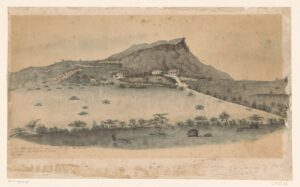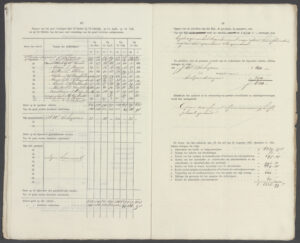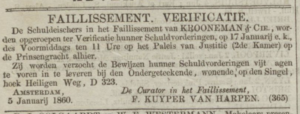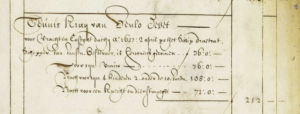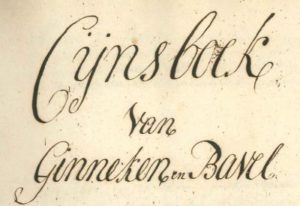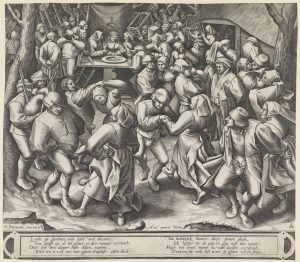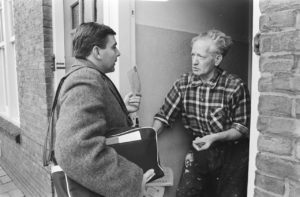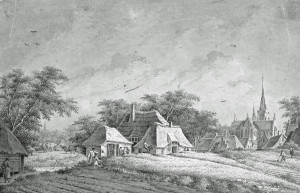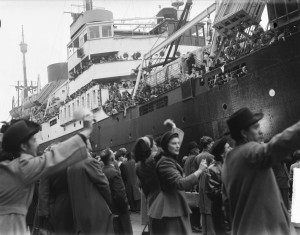The slave registers of Curacao (1839-1863) and the emancipation registers of Curacao (1863) are now available via the website of the National Archives of Curacao and National Archives of the Netherlands. … [Read more...]
Source: Municipal Reports
Since 1851, municipalities were required to write annual reports about the state of the municipality. These reports rarely give information about individual ancestors, but can be a great source of information about their circumstances. Topics you can find in municipal reports: Population Elections Names of the municipal council members Names of mayor and aldermen Finances Municipal property and works Health Police National and local militia Education … [Read more...]
Source – Bankruptcy files
If someone is unable to meet his financial obligations, the court can be asked to declare him bankrupt. The court appoints a curator who inventories the debts and assets of the bankrupt person, who the creditors are, and how they can best be paid. When everything is settled, which could take years, the bankruptcy is ended. Bankruptcy files Records are created of all the actions that happen after somebody is declared bankrupt. Together, these form a bankruptcy files. These files are part of the … [Read more...]
Source: Emigrants to New Netherland (1650-1664)
The New York State Archives in Albany houses many colonial Dutch records. Among those records is an account book of the West India Company, which includes payments for passage to New Netherland from 1650 to 1664. This is a great source of information about New Netherland ancestors. Example: Teunis Kraij This entry for Teunis Kraij translates to: Teunis Kraij from Venlo, debit for passage and victuals when he came here on the ship Draetvat [Wire Cask] on 2 April 1657 AD, skipper Jan Jansen … [Read more...]
Source – Rent Registers
"Cijnzen" or rents are rights to annual proceeds. The rights could be attached to land or property, certain official functions, or rights in common grounds. In the Middle Ages up until say the 1700s, rents were often paid in kind, for example in grain. Dominion rents Rents could be attached to a domain, the area belonging to an overlord. For example, the overlord could give land to a family in exchange for an annual payment. These rents were perpetual. Rents could also be required to pay in … [Read more...]
Source – Notarial records
Notarial records are created by a public notary and serve as legal proof of the information contained in the record. Information in notarial records Examples of the types of records you can find in notarial archives are: Real estate transactions (sales, conveyance) Debts Obligations Auctions Prenuptial agreements Last wills Estate divisions Work contracts Replacement contracts for enlisted men Powers of attorney A notary created copies of most of the records … [Read more...]
Source – Publication of the banns
In the Netherlands, you have to go in "ondertrouw" before you get married. This means that the banns are read, giving everyone in the community a chance to object to the marriage. In the period before the introduction of the civil registration, church records are the most important source of vital information. Many churches recorded the banns rather than the marriage. They recorded when the couple registered the banns, and sometimes noted the marriage announcements on three different times, … [Read more...]
Source – Census records
The first nation-wide census of the Netherlands was held in 1795, during the French occupation. The first official Dutch census that recorded every individual was held in 1830 and was held every ten years. In 1850, the population register was introduced to keep the population information up-to-date in between censuses. Initially, the census was used to verify and correct the population registers. With the introduction of digital record keeping, this was no longer necessary so the decennial … [Read more...]
Source: Borgbrief (Bond letter)
Before the mid 1800s, if you wanted to move to a new place, you had to provide proof that you would not be a liability to the town. You would be required to submit a bond letter to the authorities, wherein the poor administration or civil authorities of your previous town declared that they would take care of you if you became poor. These letters were called "borgbrieven" [bond letters] or "akte van indemniteit" [record of indemnity] and can be a wonderful source of information about migration … [Read more...]
Source – Staten van Landverhuizers
In the 1840s, when religious tensions were high and crops were failing, many people left the Netherlands to start a new life in America. The national government wanted to know what was going on. Since 1848, they required each province to keep lists of emigrants, the "Staten van Landverhuizers" [tables of emigrants]. Between 1831 and 1847, only numbers were recorded, but since 1848 the heads of households were listed. Contents of the Staten van Landverhuizers The provincial lists were compiled … [Read more...]
